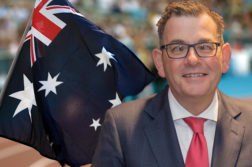During last year’s presidential election campaign in the United States, Barack Obama spoke often of boosting his country’s military presence in Afghanistan. Since taking office on 20 January, his Administration has already approved the deployment of a further 17,000 American troops to the troubled Central Asian nation. The US has very publicly called for other foreign armies in Afghanistan to increase their military presence too.
Although the global financial crisis dominated discussions between Prime Minister Kevin Rudd and President Obama in Washington this week, the future direction of the US-led foreign presence in Afghanistan was also high on the agenda.
Publicly at least, Obama has avoided pressing Rudd for a surge in Australia’s military presence in Afghanistan. And while Kevin Rudd has said consistently that Australia should remain in the country to help enhance its security, he has been equally hesitant to increase Australian boots on the ground.
There is good reason for this trepidation.
A recent Newspoll found that less than one third of Australian voters surveyed supported an increase in Australia’s troop contribution to Afghanistan, even if the United States requests it. Bizarrely, the poll did not ask whether Australians supported our presence in Afghanistan in the first place. Had such a poll been conducted, it may well have exposed an even deeper problem for the Government — namely, that patience is wearing thin for the long-running conflict.
Two Australian soldiers were killed on active duty in Afghanistan last week. Another three soldiers and their interpreter were injured by an improvised explosive device in the southern Uruzgan province, where the Taliban and local Pashtun militia allies have a strong presence. The total Australian death toll now stands at 10.
(Afghanistan National Army casualties, in contrast, are likely to be more than a thousand. Unlike foreign troop casualties, for which detailed statistics are widely available, little information on Afghan soldiers is made public. A report to the UN Security Council last year found that there were 8000 deaths in the conflict during 2008. At least 1500 of these were civilian.)
If Australians continue to die in this conflict, particularly in large numbers, the Government may face a severe backlash from the electorate and be compelled to pull our troops completely or, at the very least, from frontline positions. After the Taliban captured 21 Koreans in Afghanistan in July 2007, for instance, South Korea withdrew its 210 soldiers from the country.
In truth, Australian personnel make up only a fraction of the 62,000-strong International Assistance Force for Afghanistan — although they do constitute the largest foreign non-NATO representation in the country. A further 9-10,000 United States soldiers operate independent of ISAF in Afghanistan.
That will likely be boosted by the 17,000 extra US troops over the coming Northern summer and spring — the period when the Taliban recommence their annual offensives in Afghanistan from the south and east of the country.
The Obama Administration is currently completing what it describes as a major review of its military and political strategy in Afghanistan and Pakistan. The new policy is expected to be formally announced at a NATO summit in France on 5 April.
But just how different will the Obama Administration policy be?
One expected feature will be a plan to divide the Taliban between "moderate" elements – who are more motivated by local considerations like stability or nationalism and demand the removal of all foreign troops currently occupying Afghanistan – and more "hardcore" or ideologically driven members who, as well as the removal of troops, want to create what they perceive to be a proper Islamic state. The latter group is considered too attached to the al Qaeda network to be negotiated with.
That proposal, however, was considered — and mooted — on several occasions by senior Bush administration and other Western officials as recently as last year.
Moreover, the Obama Administration’s decision to escalate attacks on suspected militant hideouts in Pakistan, including the prospect of bombing the already politically unstable Balochistan province to the south of the tribal areas where key Taliban and al Qaeda leaders are believed to be based, constitutes an acceleration of Bush administration policy, rather than a major shift.
One consistent feature of the Western presence in Afghanistan is the absence of discussion on its geostrategic interests in the region. It is said that the primary reason for being in Afghanistan is to prevent it from becoming a failed state and, thereby, a haven for terrorism.
But another aim, rarely mentioned in the mainstream media, is to create a stable regime through which Central Asia’s resource wealth may be siphoned in favour of Western businesses rather than those of rival powers China, Iran and Russia.
Another motivation is to maintain a military presence in a region in the stomping ground of the aforementioned emerging non-Western powers: China, Iran and Russia.
Of course, all these issues reveal a glaring contradiction — that is, to secure Afghanistan, foreign troops will have to defeat the Taliban in some shape or form, even if that means making peace with elements of it.
Yet, without an improvement in the dire living conditions that most Afghans experience, or a reduction in the rampant corruption, despotism and heroine trade engulfing the country, it is difficult to see how it will ever be truly safe and secure.
Donate To New Matilda
New Matilda is a small, independent media outlet. We survive through reader contributions, and never losing a lawsuit. If you got something from this article, giving something back helps us to continue speaking truth to power. Every little bit counts.



